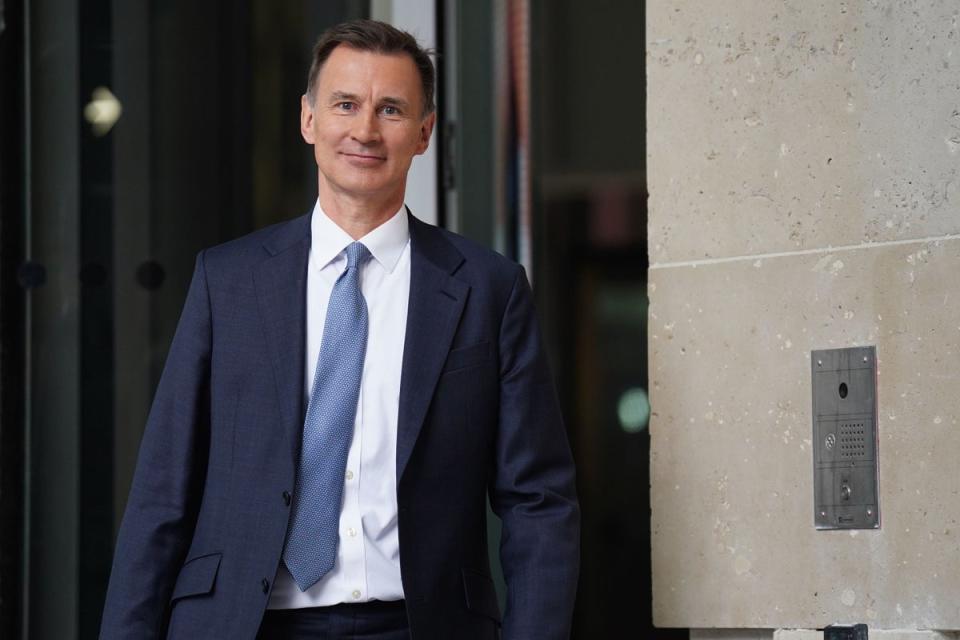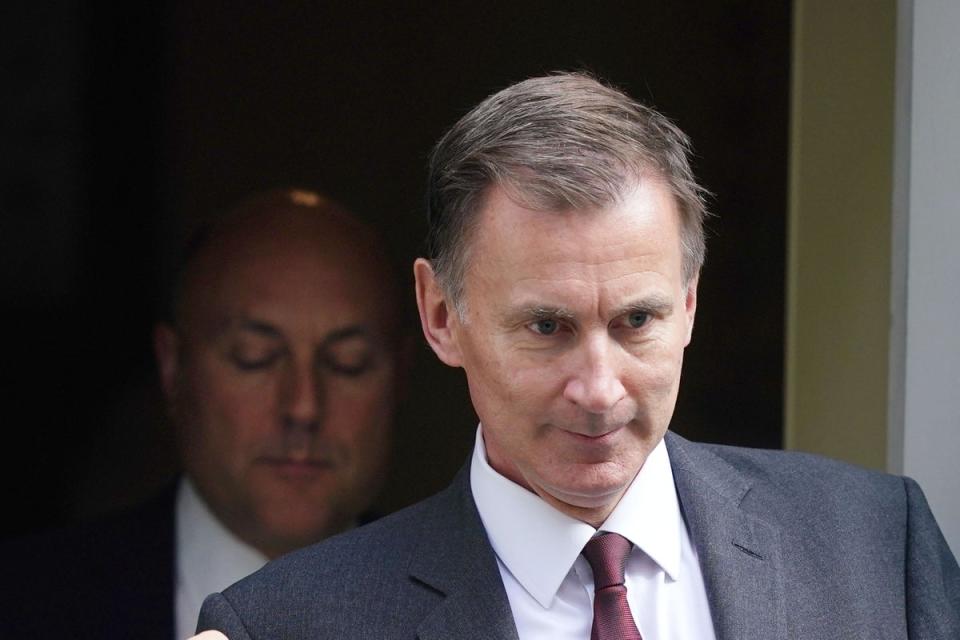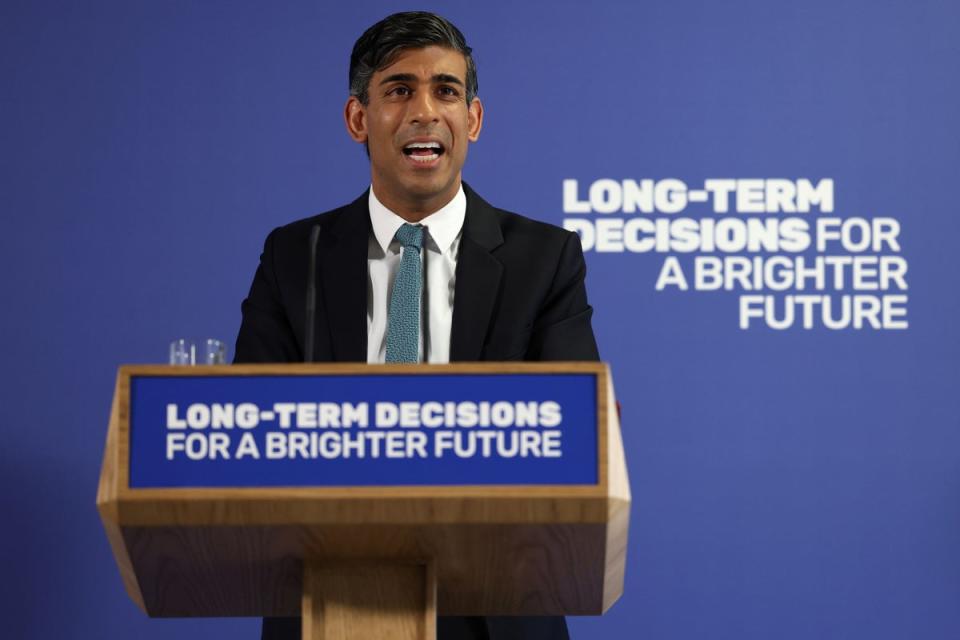What will Jeremy Hunt unveil in the Autumn Statement?

Chancellor Jeremy Hunt faces a troubling economic backdrop when he delivers his Autumn Statement to the country on Wednesday.
Economic forecasts show that growth is stagnant and Britain is teetering on the edge of a recession - while high prices and the cost of living crisis continues to impact millions of hard-pressed families.
However, last week Mr Hunt had a sliver of good news as inflation has halved over the past year, leading him to say the economy had “turned a corner” and fuelling expectations he will unveil tax cuts on Wednesday.
With an eye on next year’s general election, backbench Tory MPs are particularly keen for Mr Hunt to focus on measures that help hard up households and lower the tax burden.
Rishi Sunak has done little to dampen expectations that Mr Hunt will unveil tax cuts later week, saying on Monday the government can now “responsibly start to cut taxes.”

The Independent has summarised what we could expect on Wednesday:
Tax cuts
Mr Hunt has done little to dampen expectations he will cut taxes on businesses in a bid to boost growth and get Britain’s stuttering economy firing.
However, he has been more cautious on previously reported claims that he would use the Autumn Statement to reduce income tax or national insurance.
He suggested during a round of broadcast interviews ahead of Wednesday’s financial package that the personal tax burden will not come down “overnight” as he seeks to avoid prices spiralling again.
Mr Hunt made clear that his “priority is backing British business” after promising an “autumn statement for growth”.
“I think it’s important for a productive, dynamic, fizzing economy that you motivate people to do the work, to take the risks that we need,” he told Sky’s Sunday Morning with Trevor Phillips.
He did not rule out any specific changes, including most controversially to inheritance tax, saying “everything is on the table in an autumn statement”. He stressed that “lower tax is essential to economic growth”.
Pressed if the high pressure of income tax could be eased, he stressed the need to act “in a responsible way”.
“I want to show people there’s a path to lower taxes. But we also want to be honest with people, this is not going to happen overnight,” he said. “It requires enormous discipline year in, year out.”

Changes to inheritance tax
Mr Hunt is reportedly considering plans to cut inheritance tax, a move which would be immensely popular within his own party but would only benefit a small proportion of the public.
Currently inheritance tax is charged at 40 per cent on estates of more than £325,000, with an extra £175,000 towards a main residence passed to direct descendants. Mr Hunt is considering reducing it by 50%, 30% or 20%, as reported by The Times.
The Tories are said to then be considering making abolishing it entirely an election manifesto pledge next year, which could cost £7 billion a year in the short term.
However, the Institute for Fiscal Studies forecast that the amount that the tax raises could rise to more than £15 billion by 2033.
Shadow chancellor Rachel Reeves has said cutting inheritance tax is “not the right thing to do” now.
Asked on the BBC’s Sunday with Laura Kuenssberg if Labour would reverse any cut to inheritance tax the Conservatives may bring in, Ms Reeves said: “Cutting inheritance tax in the middle of a massive cost-of-living crisis and when public services are on their knees is not the right priority.
“I understand people’s desire to pass onto their children what they have worked hard for, but right now that is not the right thing to do and we would not support it.”
Only around 4 per cent of deaths in 2020/21 resulted in inheritance tax being paid, with exemptions allowing many couples to pass on up to £1 million tax-free.

Cuts to benefits
The government has already announced a fresh welfare crackdown in what it says is an effort to get people back to work -but Mr Hunt could also squeeze the amount of money people are receiving.
Ministers have already announced that free prescriptions and legal aid will be cut off for benefit claimants who are deemed fit to work and do not seek employment.
Typically ministers use the September figure for inflation when uprating working-age benefits, which would mean a 6.7 per cent hike.
But Mr Hunt has not ruled out using October’s far lower figure of 4.6 per cent, which economists say would cut spending by around £3 billion.
Asked about the possible move in an interview with the BBC, the chancellor said: “We will always be a compassionate Conservative government but part of how we make our economy successful is by making sure companies like this company can find the staff they need.
“Nearly a million vacancies across the economy, so we do need to reform our welfare system.”
The savings would largely impact working-age households receiving disability or means-tested benefits, according to the Institute for Fiscal Studies.
Sam Ray-Chaudhuri, a research economist at IFS, said: “Using the October rather than September inflation rate to uprate benefits would save the government money, by cutting incomes for millions of low-income working-age people. Importantly, both effects would be permanent, whether or not the move to basing annual benefit increases on the October inflation rate were to be retained in subsequent years.
“This implies that real benefit levels would not just take several years to regain their pre-pandemic values, due to the rather arcane lagged method for increasing them – they would never get back to where they were, without subsequent changes in policy.”


